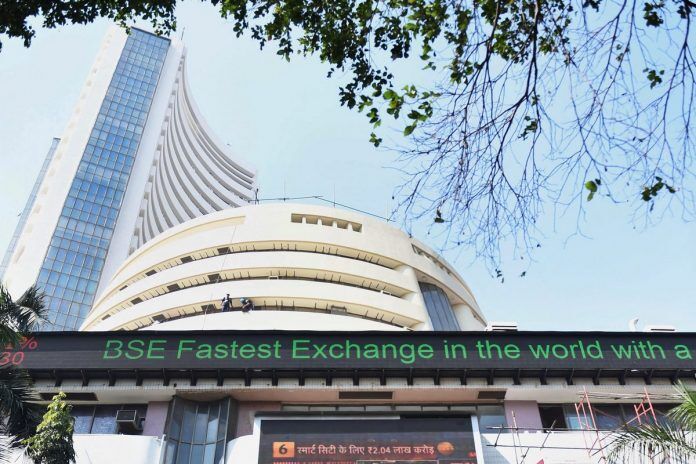Sensex suffers 4th worst fall ever

Mumbai/New York: The Sensex crashed over 2,700 points on Thursday — its biggest single-day plunge in about two years — in lockstep with a severe sell-off in global markets after Russia launched a full-scale invasion of Ukraine, plunging Europe into its biggest crisis since the Second World War.
The 30-share BSE gauge plummeted about 2,850 points during the session before closing at 54,529.91, registering a massive fall of 2,702.15 points or 4.72 per cent. This was its biggest decline since March 23, 2020, and the fourth-worst fall ever in absolute terms.
Likewise, the NSE barometer Nifty nosedived 815.30 points or 4.78 per cent to end at 16,247.95.
This was also the seventh straight session of decline for both the key indices.
On the Sensex chart, all 30 shares suffered heavy losses, with IndusInd Bank tumbling the most at 7.88 per cent, followed by M&M, Bajaj Finance, Axis Bank, Tech Mahindra and Maruti.
Investors were poorer by over Rs 13.44 lakh crore, with the market capitalisation of BSE-listed companies standing at Rs 2,42,24,179.79 crore.
Continuing their selling spree, foreign institutional investors offloaded shares worth Rs 3,417.16 crore in the Indian capital markets on Wednesday, exchange data showed.
Tracking the broader trend, all 19 BSE sectoral indices closed in the red, with realty, telecom, auto and banking diving as much as 7 per cent.
BSE smallcap, midcap and largecap gauges slipped up to 5.77 per cent.
Russian troops launched wide-ranging military attacks on Ukraine on Thursday after Moscow cast aside international sanctions and warned other countries that any attempt to interfere would lead to "consequences you have never seen".
Globally, stocks plunged and safe haven assets like gold and Japanese yen rallied amid the intensifying Ukraine crisis, which experts believe may roil the global economy.
US markets pointed toward a sharply lower open, following a global plunge in stocks and a surge in oil prices on Thursday.
Oil prices jumped by more than $7 per barrel and futures for Wall Street's benchmark S&P 500 index and the Dow Jones Industrial Average were off by more than 2.5 per cent.
Market benchmarks in Europe and Asia fell as much as 5 per cent as traders tried to figure out how large Putin's incursion would be and the scale of Western retaliation.
Energy prices surged, fueling inflation fears. The spot price in Europe for natural gas, for which the continent relies on Russia to supply, jumped as much as 31 per cent.
Brent crude oil jumped above $100 per barrel in London for the first time since 2014 on unease about possible disruption of supplies from Russia, the No. 3 producer.
Benchmark US crude was close behind at $99 per barrel. Prices of wheat and corn also jumped.
The ruble sank as much as 7.5 per cent against the dollar overnight but recovered slightly, down about 5 per cent in the morning.
The FTSE 100 in London fell 3.3 per cent after Europe awakened to news of explosions in the Ukrainian capital of Kyiv, the major city of Kharkiv and other areas.
The DAX in Frankfurt plunged 5.4 per cent and the CAC in Paris lost 4.9 per cent.
Moscow's stock exchange briefly suspended trading on all its markets on Thursday morning. After trading resumed, the ruble-denominated MOEX stock index tumbled more than 20 per cent and the dollar-denominated RTS index plunged by more than a third.
That was on top of Wednesday's 1.8 per cent slide for the S&P 500 to an eight-month low after the Kremlin said rebels in eastern Ukraine had asked for military assistance.
Some analysts expect the conflict to push investors out of many tech stocks, with the exception of the cybersecurity sector.
Growing concern that massive cyber warfare could be on the near-term horizon which would certainly catalyse an increase in spending around preventing sophisticated Russian-based cyber attacks, analysts with Wedbush Securities wrote in a note to clients.
The price for oil on international markets rose to $101.27, while West Texas Intermediate soared $7.65 to $99.75 per barrel in electronic trading on the New York Mercantile Exchange. The contract fell 25 cents to $92.10 on Wednesday.
In Asia, the Nikkei 225 in Tokyo fell 1.8 per cent to 25,970.82 and the Hang Seng in Hong Kong lost 3.2 per cent to 22,901.56. The Shanghai Composite Index shed 1.7 per cent to 3,429.96.
Asian economies face lower risks than Europe does, but those that need imported oil might be hit by higher prices if Russian supplies are disrupted, forecasters say.
The Kospi in Seoul lost 2.6 per cent to 2,648.80 and Sydney's S&P-ASX 200 fell 3 per cent to 6,990.60.
New Zealand lost 3.3 per cent and Southeast Asian markets also fell.
Investors already were uneasy about the possible impact of the Federal Reserve's plans to try to cool inflation by withdrawing ultra-low interest rates and other stimulus that boosted share prices.
The dollar weakened to 114.69 yen from Wednesday's 114.98 yen. The euro fell to $1.1168 from $1.1306.



